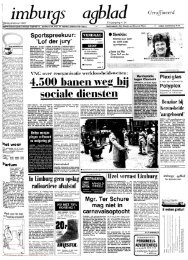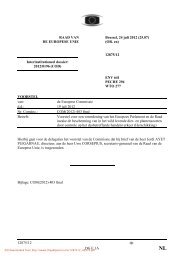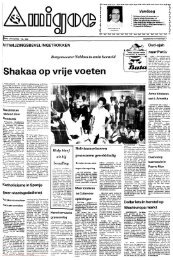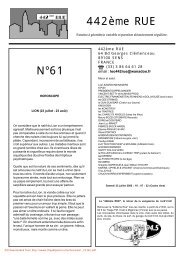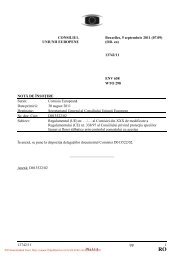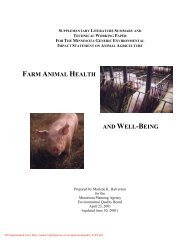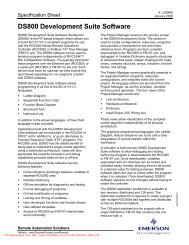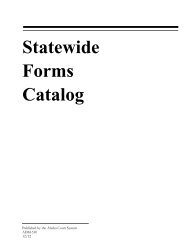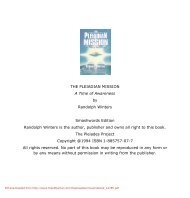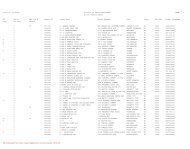American Recycler - Free PDF Hosting
American Recycler - Free PDF Hosting
American Recycler - Free PDF Hosting
You also want an ePaper? Increase the reach of your titles
YUMPU automatically turns print PDFs into web optimized ePapers that Google loves.
Section A Page 12 <strong>American</strong> <strong>Recycler</strong>, September 2008<br />
ON TOPIC<br />
Recycling in Seattle<br />
The economics of not recycling caught up with Seattle<br />
in the late 1980s. They were then faced with a problem that<br />
needed to be resolved quickly as local landfills would soon<br />
close, the citizens and politicians in the West Coast city<br />
determined that quick action was needed.<br />
This led to the start of Seattle’s solid waste diversion<br />
recycling collection programs in 1989 - programs that are<br />
considered to be some of the most effective in the nation.<br />
To learn more about what Seattle has done and is planning<br />
for the future, <strong>American</strong> <strong>Recycler</strong> spoke with Chuck<br />
Clarke, the director of Seattle Public Utilities.<br />
If a city or county were willing to<br />
make the effort and allocate the necessary<br />
resources based on best<br />
practices from Seattle and other<br />
cities, how long would it take to<br />
establish an aggressive diversion<br />
and recycling program?<br />
Clarke: Seattle increased its recycling<br />
diversion by nearly 150 percent within<br />
the first five years of instituting its residential<br />
curbside recycling program.<br />
Of America’s cities and urban centers<br />
with populations of 500,000<br />
plus, how many have matched Seattle’s<br />
achievements and what do you<br />
believe is preventing those who have<br />
not done so, from establishing similar<br />
programs?<br />
Clarke: Recycling has been a success<br />
story for many <strong>American</strong> cities, including<br />
Portland and San Francisco. They’ve<br />
done it by changing the way they think of<br />
garbage, not as a necessary evil and<br />
municipal revenue source, but literally as<br />
a waste on the environment, a waste on<br />
their community and a waste of resources.<br />
Participation by the residential and<br />
non-residential sectors is essential<br />
to the success of recycling and<br />
diversion programs. In terms of an<br />
education program, what are the<br />
necessary elements that a municipality<br />
must implement to get both<br />
sectors on board?<br />
Clarke: Businesses and residents need<br />
clear information on what to recycle, how<br />
Q & A<br />
by Irwin Rapoport<br />
What are the necessary “carrots”<br />
that a municipality must employ to<br />
get the residents and businesses to<br />
actively participate in diversion and<br />
recycling programs?<br />
Clarke: Seattle offers a “pay as you<br />
throw” garbage can system that serves<br />
as a terrific incentive for businesses and<br />
residents to recycle. The bigger the can<br />
you need for your garbage, the more you<br />
pay, which is a simple way to encourage<br />
recycling.<br />
For those few who don’t recycle, the city<br />
has prohibited recyclables from the<br />
garbage. Apartments and businesses<br />
face fines if they repeatedly don’t recycle,<br />
and households risk not having their<br />
garbage picked up if they don’t recycle.<br />
Five years ago, Seattle banned citizens<br />
from placing recyclables in<br />
their trash. Has this policy been<br />
accepted by the majority of people?<br />
Is the city still issuing fines for noncompliance?<br />
Clarke: The vast majority of businesses<br />
and residents support our recycling ordinance,<br />
with more than a 98 percent recycling<br />
compliance rate and a 10 percent<br />
increase in diversion since the ordinance<br />
passed in 2003. Last year, less than 20<br />
fines were levied against apartments and<br />
businesses for not recycling.<br />
Midwest Auto & Equipment<br />
SUPPLIERS OF FORKS, LOADERS & PARTS<br />
‘98 CAT IT28G ................. 62,900<br />
Low hours, this machine is in<br />
cherry condition! (932)<br />
Terex TXL-200 .... $69,500<br />
(2) Excellent condition, <strong>American</strong><br />
coupler system, A/C, Michelin radials,<br />
770 hrs. & 1,650 hours (927)<br />
‘99 John Deere TC54H<br />
......................................$59,500<br />
(544H) tool carrier, JRB coupler system,<br />
A/C (928)<br />
Case 921B, big loader, good cond., grapple bucket (857) ........ $49,500 Fiat Allis FR-12B, just in, new center pins ....................................... $24,900<br />
CAT 914-G ‘02, very nice (911) ........................................... $39,500 Ford A-64, forks & bucket (713) .............................................. $17,900<br />
Dresser 510, low hours, excellent conditions ......................... $17,900 Hough 90E, 4 yd. bucket, Detroit engine ............................................ $11,900<br />
Fiat Allis FR15 (874) .......................................................... $24,900 Hundai 740-3 ‘00, nice condition! (912) ........................................ $39,500<br />
(2)Fiat Allis FR-20B (865 & 847) ...................................... $29,500 JCB, 436BHT ‘98, 30,000 lbs. machine w/coupler, A/C (924) ............ $49,500<br />
Fiat Allis 745-C (851) ........................................................ $20,900 John Deere 544, includes forks & bucket ....................................... $12,900<br />
Fiat Allis FR-15B, prior gov.-owned, very nice ..................... $32,900 New Holland LW80 ‘00, (2) coupler, bucket, fork (919) ............... $34,900<br />
Fiat Allis 545B, new engine, includes forks .......................... $17,900 Trojan 1500Z, foam-filled tires, low hrs., prior gov. (926) .................. $17,900<br />
Fiat Allis FR220, 5 yd. bucket (915) ............................................ $39,500 Volvo L-90C ‘97 ............................................................................ $49,500<br />
Fiat Allis FR-140 Cummins ........................................................ $29,500 Volvo L70, with forks, foam-filled tires, very nice condition (616) ........ $25,900<br />
See our Complete Inventory at: www.Midwest-Auto.com<br />
800-234-4464, Ext. 2 Fax 507-932-4497 Hwy. 14 West, St. Charles, MN<br />
Pdf downloaded from http://www.thepdfportal.com/0908_31652.pdf<br />
—Chuck Clarke<br />
to recycle, and why recycling is important<br />
both economically and environmentally.<br />
This information should be presented frequently.<br />
Reward program nearly<br />
doubles recycling rate<br />
RecycleBank and AAA Recycling<br />
and Trash Removal Services of Fairfax,<br />
Virginia, announced that residential<br />
recycling rates have increased 90 percent<br />
after the implementation of an innovative<br />
program designed to encourage<br />
more recycling. The increase in recycling<br />
is tied to RecycleBank, a new program<br />
offering from AAA to their customers<br />
that uses rewards to motivate<br />
people to recycle. After launching the<br />
program on June 2, 2008, households<br />
have nearly doubled the amount of waste<br />
they recycle.<br />
RecycleBank motivates households<br />
and communities to recycle by measuring<br />
the amount of recyclables from each<br />
household and then converting the<br />
weight into RecycleBank points. These<br />
points can be viewed and redeemed at<br />
www.recyclebank.com with over 450<br />
national and local RecycleBank reward<br />
partners.<br />
“We knew that our customers could<br />
do more recycling and RecycleBank<br />
provided the motivation,” said Brad<br />
Baty, general manager of AAA Recycling<br />
and Trash Removal Services.<br />
“RecycleBank is a great way for us to<br />
improve environmental efforts by raising<br />
curbside recycling rates. RecycleBank’s<br />
program presented AAA with the opportunity<br />
to be the channel through which<br />
the increased participation is realized.”<br />
Participating households redeem<br />
their RecycleBank points with national<br />
Farm waste<br />
Continued from Page 11<br />
farms and when processed, are placed in<br />
a pressure cooker that is employed to<br />
reclaim the protein and other materials.<br />
Most of the large meat packing<br />
plants also operate their own rendering<br />
operations. Smaller packing plants, of<br />
which there are many, send the bones,<br />
offal and hides to rendering plants. The<br />
hides, depending on how they are treated,<br />
are valuable and many of them are<br />
shipped overseas.<br />
Powell stresses that farmers and the<br />
agricultural community in general, have<br />
always practiced recycling – using what<br />
they can to maximize revenues in<br />
processes and procedures that make economic<br />
sense.<br />
“That is where we end up looking at<br />
composting,” he says. “We do have onsite<br />
burial of animals, but we don’t like<br />
to see that. It’s a pretty small number<br />
and simply done because it is the most<br />
economical measure.”<br />
The KDHE’s Bureau of Water is<br />
behind much of the regulations regarding<br />
the use of manure on fields and how<br />
composting is done and where such<br />
operations can be located. The regulations<br />
are designed to ensure that the<br />
spraying of manure is based on the principle<br />
that the plants consume whatever is<br />
sprayed (based on agronomic rates) and<br />
that there are no leftover materials that<br />
could potentially contaminate the water<br />
table by seeping into the water table or<br />
RecycleBank reward partners such as<br />
Coca-Cola, Kraft Foods, Green Mountain<br />
Coffee, and CVS/pharmacy, as well<br />
as with local Northern Virginia retailers<br />
such as Shoppers, Anita’s, Paisano’s<br />
Pizza, and Broadway Gallery. Many<br />
local and national retailers recognize the<br />
value of partnering with an environmentally-friendly<br />
company such as Recycle-<br />
Bank. Reward partners gain exposure in<br />
the marketplace, which leads to customer<br />
loyalty and repeat business. Additionally,<br />
households recognize the value<br />
of shopping with retailers that believe in<br />
the importance of environmental initiatives<br />
and community.<br />
“The RecycleBank program has<br />
been absolutely fantastic for our community<br />
and was frankly long overdue”,<br />
says Peter Brownell, RecycleBank member<br />
and AAA customer. “We were conscientious<br />
before, but now that we have<br />
the program we’ve increased our household<br />
recycling tremendously and use our<br />
rewards points for useful, everyday purchases.”<br />
“As RecycleBank continues to<br />
expand across the country, our vision to<br />
preserve the environment by dramatically<br />
increasing household recycling rates<br />
becomes more and more attainable,” said<br />
Ron Gonen, co-founder and CEO of<br />
RecycleBank.<br />
With the program’s immediate success,<br />
AAA is considering the implementation<br />
of RecycleBank in other markets.<br />
flow into open pipes, streams or rivers.<br />
“Manure has nitrate and if you put<br />
too much nitrate on, then you end up<br />
with your wells being contaminated,<br />
blue baby syndrome and other health<br />
hazards that can effect seniors and<br />
adults,” says Powell.<br />
Due to the increasing price of scrap<br />
metal, scrap dealers are now actively<br />
seeking material from rural states such<br />
as Kansas, seeking old machinery that<br />
can be found on many farms.<br />
“There is a tremendous amount of<br />
old machinery that gets generated on<br />
these farms and now that scrap iron<br />
prices are going up,” says Powell, “I’m<br />
seeing a lot of it disappear. That’s a good<br />
thing. It gets it out of the pastures. My<br />
folks, who have a farm, have decades of<br />
old machinery and are actually talking<br />
about having someone come in and<br />
clean it all up.”<br />
He adds that this material should be<br />
recycled and that more and more scrap<br />
dealers are visiting farm country in<br />
search of metal.<br />
Rodney Ferguson, public service<br />
executive of the KDHE’s Waste Reduction,<br />
Public Education, and Grants Unit,<br />
appreciates the efforts of farmers to<br />
recycle their agricultural waste.<br />
“It is often said that the farmer is<br />
the best steward of the land,” he says.<br />
“There is a quality there that has been<br />
passed from generation to generation<br />
that you have to take care of the land.<br />
That would include off-farm activities<br />
such as recycling household materials.”



